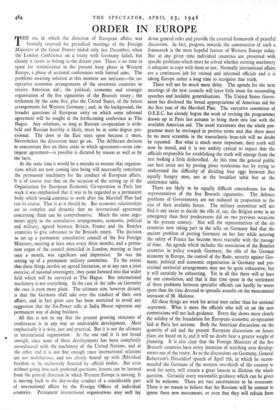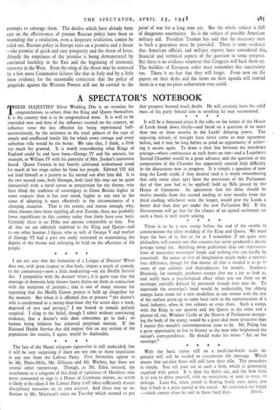ORDER IN EUROPE
THE era in which the direction of European affairs was formally reserved for periodical meetings of the Foreign Ministers of the Great Powers ended only last December, when the London Conference on a treaty with Germany failed, but already it seems to belong to the distant past. There is no time to spare for reminiscence in the present busy phase in Western Europe, a phase of sectional conferences with limited aims. The problems awaiting solution at this moment are intricate—the co- operative economic arrangements of the seventeen countries to receive American aid ; the political, economic and strategic organisation of the five signatories of the Brussels treaty ; the settlement by the same five, plus the United States, of the future. arrangements for Western Germany ; and, in the background, the broader questions of European unity on which some informal agreement will be sought at the forthcoming conference at The Hague. Any solutions, so long as Russian co-operation is with- held and Russian hostility is likely, must be in some• degree pro- visional. The door to the East stays open because it must. Nevertheless the discussion must go on. The deliberate decision to concentrate first on those areas in which agreement—even con- tingent agreement—is possible is dictated by reason as well as by the facts.
At the same time it would be a mistake to assume that organisa- tions which are now coming into being will necessarily constitute the permanent machinery for the conduct of European affairs. It is of course true that on the occasion of the setting up of the Organisation for European Economic Co-operation in Paris last week it was emphasised that it was to be regarded as a permanent body .which woulcLcontinue to work after the Marshall Plan had run its course. That is as it should be. But economic relationships are so complex and dynamic that no international agreement concerning them can be comprehensive. Much the same argu- ments apply to the consultative arrangements, economic, political and military, agreed between Britain, France and the Benelux countries to give substance to the Bruisels treaty. The decision to set up a permanent consultative council of the five Foreign Ministers, meeting at least once every three months, and a perma- nent organ of the council domiciled in London, meeting at least once a month, was significant and impressive. So was the setting up of a permanent military committee. To the extent that these things involve an agreed limitation, or at any rate a joint exercise, of national sovereignty, they point forward into that wider field which will be surveyed at The Hague. But international machinery is not everything. In the case of the talks on Germany the case is even more plain. The ultimate aim, however distant, is that the Germans shall take over . the conduct of their own affairs, and in fact great care has been exercised to avoid any suggestion that the Six-Power talks at India House represent any permanent way of doing business. All this is not to say that the present growing structure of conferences is in any way an undesirable development. Most emphatically it is wise, just and practical. But it is not the ultimate in international organisation. At the one end it is not broad enough, since none of these developments has been completely co-ordinated with the machinery of the United Nations, and at the other end it is not fine enough since international relations are too multifarious, and too closely bound up with individual freedom to be exclusively directed by official bodies. But even without going into such profound questions, lessons can be learned from the general direction• in which Western Europe is moving. It is moving back to the day-to-day conduct of a considerable part of international affairs by the Foreign Offices of individual countries. Permanent international organisations may well lay down general rules and provide the essential framework of peaceful discussion. In fact, progress towards the construction of such a framework is the most hopeful feature of Western Europe today. But at any given time individual countries are presented with specific problems which must be solved whether existing machinery is adequate to cope with them or not. Normally international affairs are a continuous job for trained and informed officials and it is taking Europe rather a long time to recognise that truth.
There will not be much more delay. The agenda for the next meetings of the new councils will leave little room for resounding speeches and laudable generalisations. The United States Gover- ment has disclosed the broad appropriations of American aid for the first year of the Marshall Plan. The executive committee of O.E.E.C. has already begun the work of revising the programmes drawn up in Paris last autumn to bring them into line with the available American aid., The usual statements that the whole pro- gramme must be envisaged in positive terms and that there must be no mere scramble in the transatlantic bran-tub will no doubt be repeated. But what is much more important, their truth will now be tested, and it is not unduly cynical to expect that the officials responsible for establishing the truth will emerge from the test looking a little dishevelled. At this time the general public can best assist not by passing pious resolutions but by trying to understand the difficulty of dividing four eggs between five equally hungry men, not at the breakfast table but at the conference table.
There are likely to be equally difficult conundrums for the representatives of the five Brussels signatories. The defence problems of Governments are not reduced in proportion to the size of their available forces. The military committee will not find it any easier to decide the role of, say, the Belgian army in an emergency than their predecessors did on two previous occasions in the present century. Nor will the representatives of the six countries now taking part in the talks on Germany find that the ancient problem of putting Germany on her feet while assuring the safety of France has become more tractable with the passage of time. An agenda which includes the association of the Benelux countries in policy towards Germany, the role of the German economy in Europe, the control of the Ruhr, security against Ger- many, political and economic organisation in Germany and pro- visional territorial arrangements may not be quite exhaustive, but it will certainly be exhausting. Yet in all this there will at least be one consolation, and that is that time spent in the settlement of these problems between specialist officials can hardly be worse spent than the time devoted to sporadic assaults on the monumental unreason of M. Molotov.
All these things are work for actual men rather than for notional supermen. What is more the officials who will sit on the new commissions will not lack guidance. Every day shows more clearly the solidity of the foundation for European economic co-operation laid at Paris last autumn. Both the American discussions on the quantity of aid and the present European discussions on future plans are based on it, and it will no doubt bear a greater weight of planning. It is also clear that the Foreign Ministers of the five Brussels countries have every intention of watching over develop- ments out of the treaty. As to the discussions on Germany, General Robertson's Dusseldorf speech of April 7th, in which he recom- mended the Germans of the western two-thirds of the country to work for unity, will remain a great beacon to illumine the whole question. Certainly every reasonable guidance which can be given will be welcome. There are vast uncertainties to be overcome. There is no reason to believe that the Russians will be content to ignore these new movements, or even that they will refrain from attempts to sabotage them. The doubts which have already been cast on the effectiveness of present Russian policy have been so wounding that a retaliation, even a desperate retaliation, cannot be ruled out. Russian policy in Europe rests on a promise and a threat —the promise of quick and easy prosperity and the threat of force. Already the emptiness of the promise is being demonstrated by continued hardship in the East and the beginning of economic recovery in the West. Even the sting of the threat may be removed by a few more Communist failures like that in Italy and by a little more evidence for the reasonable conjecture that the policy of pinpricks against the Western Powers will not be carried to the point- of war for a long time yet. But the whole subject is full of dangerous uncertainty. So is the subject of possible American military aid. President Truman has said that the necessary men to back a guarantee must be provided. There is some evidence that American officials and military experts have considered the. financial and technical aspects of the question to some purpose. But there is no evidence whatever that Congress will back them up. The builders of European order must remember this uncertainty too. There is no fear that they will forget. From now on the papers on their desks and the items on their agenda will remind them in a way no pious exhortation ever could.



































 Previous page
Previous page